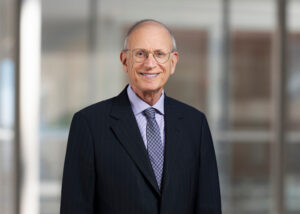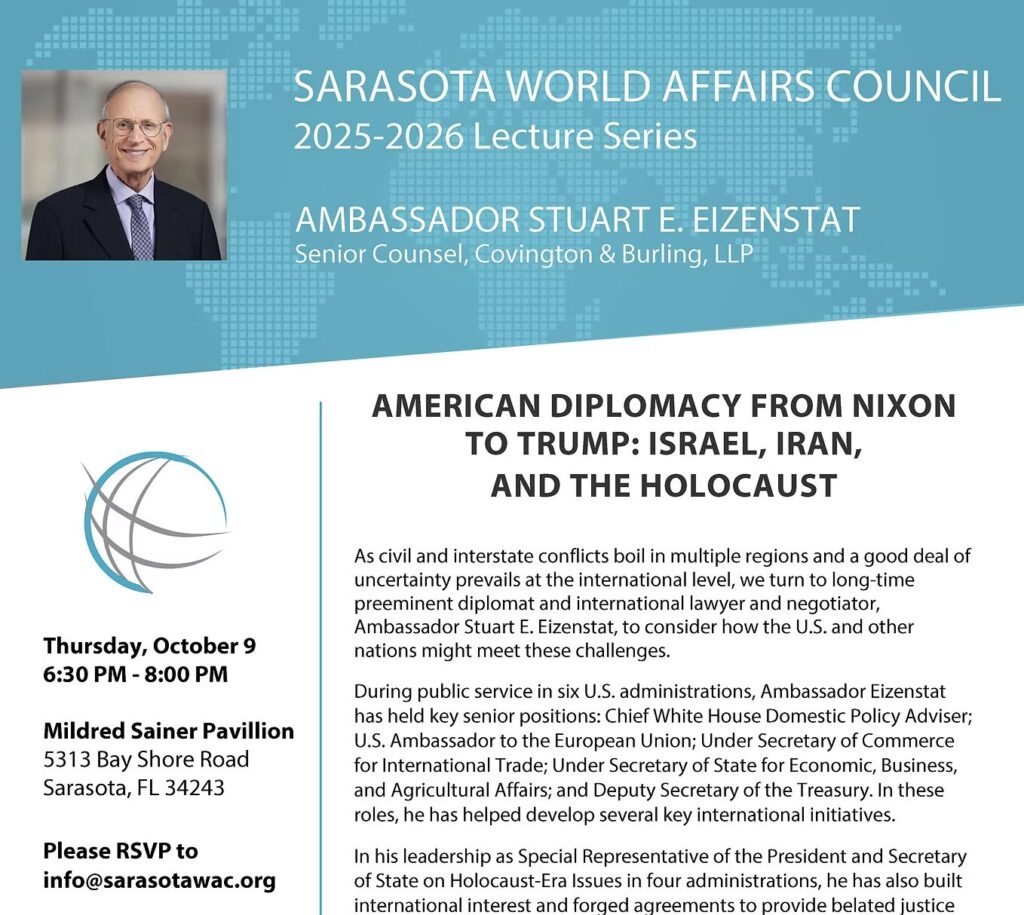In an interview with WSLR, Stuart Eizenstat talks about muscular response to tyrants, the ‘disruptor in chief’, and Carter’s achievements.
By Johannes Werner
Original Air Date: October 8, 2025
Host: Stuart Eizenstat is the essential diplomat. Since the 1970s, he has been part of key moments and elements of U.S. foreign policy. He will be speaking Thursday night at New College of Florida as a guest of the Sarasota World Affairs Council. He was originally scheduled to appear here in January, but he gave the main eulogy during Jimmy Carter’s memorial service at the National Cathedral in Washington instead. WSLR News talked to Eizenstat by phone before his visit to get an idea what he will bring to the table.
Johannes Werner: The rise of fascism and the Holocaust—and how to prevent a replay—have been key motivators throughout his diplomatic career. Ambassador Stuart Eizenstat has negotiated Holocaust indemnification and restitution with European governments and industries. His efforts led to billion-dollar agreements with Switzerland, Germany and Austria about looted bank accounts, unpaid insurance policies, forced labor claims and the return of stolen art.
In Eizenstat’s mind, 1938 is a key year of things gone wrong, and much of his thinking revolves around what the United States can do to prevent future yielding to authoritarian leaders. On top of his list is a muscular response.

Stuart Eizenstat
Stuart Eizenstat: One of the major lessons of the Holocaust—and that we see repeated in genocides, for example of the Rohingya in Myanmar and Burma, that we’ve seen in Cambodia, that we saw in Rwanda—is that the world has to act quickly against tyrants. When they do, they can stop genocides in their tracks. The tragedy of the Holocaust—and the lesson—was we sat back and didn’t do anything until it was too late on the humanitarian side. We only got in the war when Hitler declared war on us. We didn’t declare war on him. 1938 was the key year. In 1938, he had Kristallnacht (…), and when FDR was asked, “What are you going to do about this, Mr. President?” he said, “Well, it’s a terrible thing, but I’m going to leave it to the State Department.”

A synagogue on fire in Hannover on November 10, during Kristallnacht. Photo by Wilhelm Hauschild
JW: Appeasement of Hitler and Mussolini did not work in 1938, he says.
SE: All of these sent signals of weakness on the part of the West. The lesson, to me, is to confront. This is why I had some real concerns about President Trump’s policies on Russia, which have now—within the last two weeks—taken a positive turn: You cannot let a tyrant get away with invading a sovereign country, because if you let them do that, it only whets their appetite.
JW: But what about the United States itself—with a president talking about taking over Canada, Greenland and Panama, should the rest of the world be concerned? Eizenstat is more concerned about the “United” in the United States than about its authoritarian tendencies.
SE: I think that the kind of polarization we have here is a real problem. Our democracy is not a parliamentary democracy. It’s specifically divided power between the president and the congressional branch. If there’s not a spirit of compromise, then we cannot show the world that we’re able to tackle 21st century challenges. That’s unfortunately the kind of signal we send when we can’t do something as simple as passing a budget resolution to fund the agencies.
JW: Eizenstat calls Trump the “disruptor in chief.” Asked about the role of diplomacy in Trump’s foreign policy, he credits him for convincing NATO members to boost military spending and for the current peace negotiations over Gaza. But he is highly critical of Trump’s dismantling of USAID, his slimming down of the State Department—he calls that “a gift to China.” He reserves his biggest criticism to Trump’s America First policies, with its rejection of multilateral institutions the United States helped build after World War 2.
SE: It’s very much an “America first, America alone” policy. We see this with the tariffs that were unilaterally put on allies as well as adversaries.
 JW: Eizenstat was deeply involved in the Jimmy Carter campaign and the Carter administration, and he published two books on the achievements of the one-term president, who is often portrayed as a failure.
JW: Eizenstat was deeply involved in the Jimmy Carter campaign and the Carter administration, and he published two books on the achievements of the one-term president, who is often portrayed as a failure.
Under Carter, Congress passed fundamental laws that make up today’s legal body determining ethics—conflicts of interest, disclosure and lobbying—and transparency. Another set of reforms were about civil service.
The Carter administration, on the heels of an oil crisis, also introduced energy security into U.S. policy, turning the United States into a major oil and gas producer, while also emphasizing a turn towards energy conservation and renewable energy.
Then, there are Carter’s achievement in education, with the creation of the Department of Education, and big improvements for low-income students.
Finally, the four Carter years were a pinnacle of peacemaking through diplomacy. Eizenstat says handing over the Panama Canal to the county where it is located avoided a conflict and opened a new chapter in U.S. relations with Latin America. And the Camp David Treaty between Israel and Egypt still is in effect today.
SE: The pinnacle of diplomacy I think—never before or after met—was his 13 days and nights at Camp David with Prime Minister Begin and President Sadat leading to the Camp David Accords still in effect today. It’s the longest standing treaty with an Arab country, and you can see its importance today in the role Egypt has played in Gaza.
JW: For details about Eizenstat’s talk Thursday, 6:30 in Sarasota, go to sarasotawac.org.
For WSLR News, Johannes Werner.
WSLR News aims to keep the local community informed with our 1/2 hour local news show, quarterly newspaper and social media feeds. The local news broadcast airs on Wednesdays and Fridays at 6pm.